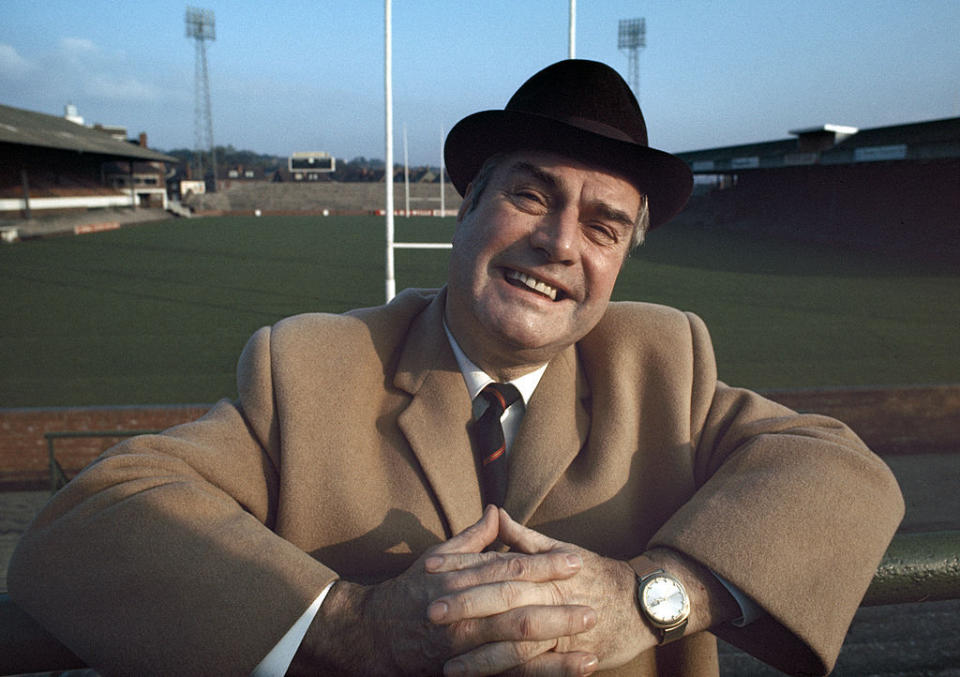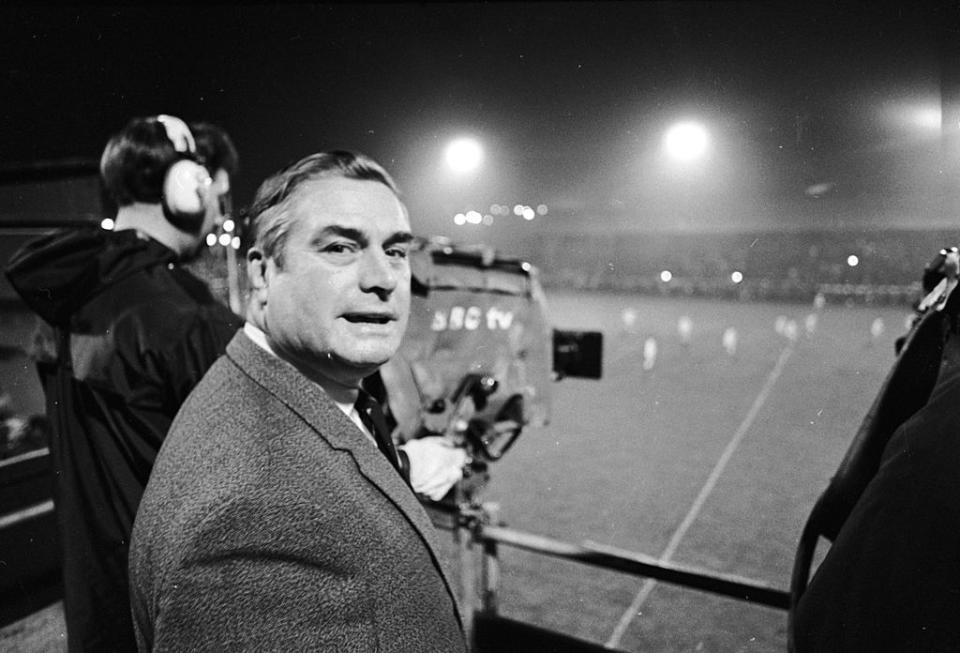yahoonick
In our weekly series, Yahoo Sport’s Nick Metcalfe features a famous voice of sport. With the Super League Grand Final taking place this weekend at Old Trafford, the memorable BBC rugby league commentator Eddie Waring is the latest to go under the spotlight.

Eddie Waring was a true one-off in the world of sports commentary. For decades, he was one of the most familiar voices for fans across Britain.
I’ve profiled many genuine all-rounders in this series, but Waring is one of those broadcasters that will always be associated with one sport, in his case rugby league.
As a youngster Waring was actually a fine footballer, good enough to have trials with Nottingham Forest and Barnsley. But he did, of course, have a huge regard for rugby league from the start.
His journalism career began, as is the case with so many broadcasters, in local newspapers. Waring reported on rugby league matches, while also running his local Dewsbury Boys Club.
During World War Two, Waring - who was exempted from military service with an ear condition - actually managed Dewsbury. He led the club to Challenge Cup glory in 1943.
After the war he travelled with the Great Britain team on their 1946 tour of Australia as a reporter. A classic Waring moment was said to occur on the way back. Travelling home via America, he met the celebrated actor and comedian Bob Hope, who told him about the early success of televised sport in America. Waring became convinced that rugby league’s future success could depend on television coverage.
He had actually been writing to the BBC since he was he was in his early 20s. He was rejected on a number of occasions, but was eventually given his chance when the corporation began to properly cover the sport.
Waring’s commentary style was a distinct one. He made an impression from the start. It’s fair to say most of the voices at the BBC were plummy, southern and from the middle and upper classes. Waring was none of those things. A proud northerner, he said it as he saw it. You’d probably call it plain speaking. With an eccentric streak that endeared him to many.

The BBC’s long-running Saturday afternoon programme, Grandstand, was in need of a staple sport to see it through the long autumn and winter months. And rugby league fitted the bill perfectly. Viewers across the nation watched in their millions as Waring described the second half of matches live, before football results came in.
Waring’s favourite sayings soon became catchphrases, like “it’s an up and under” as the ball was kicked high into the air, or “he’s going for early bath” as a player was sent off. Fans on the terraces would repeat those sayings to each other, along with millions of viewers in thier living rooms. And there was of course that memorable accent. Hull Kingston Rovers was “Hulking Stan Rovers" in the Waring era.
As many as six million would tune in to see matches on a Saturday. For many of those watching, Waring was seen as an “Uncle Eddie” figure, a warm and comforting presence that would keep them company throughout the darker months.
Incredibly, for a commentator, Waring was slowly but surely becoming the most well known figure in the whole sport. As former Wales rugby union international, turned TV man, Cliff Morgan once said: “For thousands of people, Eddie Waring is rugby league.”
The most celebrated of rugby league’s competitions was the Challenge Cup, with the final at Wembley in May seen as one of the great days in British sport. The BBC always made a big deal of the occasion, and Waring was of course at the heart of those spring afternoons.
At the 1968 final between Leeds and Wakefield Trinity, Waring produced one of the most memorable lines in the history of sports commentary. It was a filthy day at Wembley, with constant rain hampering both teams. Leeds were winning a narrow contest, when a late try from Trinity looked to have swung the match their way.
All the great Don Fox needed to do was slot the conversion over from in front of the posts. Unfortunately for Fox, we all know what happened next. Cue Eddie.
“He’s missed it, he’s missed it, he’s on the ground, he’s missed it, and there goes the whistle for time. Everybody has got their head in their hands. And he’s in tears. He’s a poor lad. Poor Don Fox has always wanted to come to Wembley.”
I actually think it’s a wonderful commentary moment. Not only did Waring perfectly articulate what millions of viewers would have been thinking at that moment, he did it in such a warm-hearted way. There was something so obviously genuine about the sadness and sympathy Waring felt for Fox.
And of course, along with other iconic commentary lines like “They think it’s all over… it is now” and “Where oh where were the Germans… but who cares?”, most sports lovers know “he’s a poor lad” - words spoken by Waring nearly half a century ago.
Waring didn’t just commentate on a Saturday afternoon, but regularly on a Tuesday night too, with the Floodlit Trophy running from 1965 to 1980. Waring had long believed the game should be played under lights. And one match each week took place in the evening, with the second half shown live on BBC2.
It’s probably hard to imagine for younger viewers, but second half coverage of various sporting events was once commonplace on TV and radio. And the Floodlit Trophy is a competition still fondly remembered by rugby league fans of a certain age.
Waring didn’t just become a famous voice, but a face on our screens too. Often wearing his trademark trilby hat, he enjoyed a spell presenting It’s A Knockout. He was also a guest on a number of the BBC’s most celebrated programmes of the time, like Morecambe and Wise. Britain’s most famous impressionist back then, Mike Yarwood, regularly mimicked him.
That leads me into the other side of the Waring story, one that does need to be reflected. The idea had that he had become something of a caricature. Rugby league has always had a fiercely loyal and proud fan base, and many in that community believed Waring wasn’t the best person to sell the game. Indeed, some went as far as to say he belittled the sport.
Perhaps his routine simply struck a nerve with some in the north, believing he fed the cliche in other parts of the country about their characters and personalities. Some fans called for Waring to be replaced, especially in his latter years when he seemed to struggle more with his commentaries. Partly, this could be explained by him suffering with early symptoms of Alzheimer’s.
The criticism was known to cause great hurt to Waring. Perhaps understandably, he felt that he had given much to the sport he loved. The BBC were well aware they still had one of the most famous broadcasters in Britain on their books, and they loyally stuck by him.
One of the most unfortunate incidents of those later Waring years came during a Challenge Cup first round tie between Leeds and Halifax in 1978, when a black and white collie dog invaded the pitch and refused to budge. Instead of ignoring the situation, the BBC played up to it. Our canine friend was captioned “K Nine”, while Waring commented at one time that the dog has wandered into an offside position. Many in the sport believe it showed rugby league in an amateurish light.
Waring was clearly nearing the end of his career, and he did eventually leave the stage. His last Challenge Cup final commentary came in 1981, where he described Widnes overcoming Hull Kingston Rovers, or “Hulking Stan Rovers”, at Wembley.
Sadly, his health further declined in the years after he retired. Waring died in 1986 at the age of 75. We had lost probably the most famous character that had ever been involved with rugby league, and one of the most celebrated voices of the early decades of television sports coverage in Britain.
It’s funny to think of the sport now in relation to Waring’s heyday. The professional game is played in the summer now, with most of the matches on pay TV. And on Saturday night at Old Trafford, there will be a real sense of glitz and glamour as Warrington do battle with Wigan for the Super League title. You get the feeling Waring may have rather liked today’s show. He did after all have that pioneering part to his character.
It’s fair to say that to this very day, he has his dissenters. But surely nobody can doubt the importance of Waring’s place in the history of his beloved sport. One thing is for sure - there will never be another quite like Eddie.


